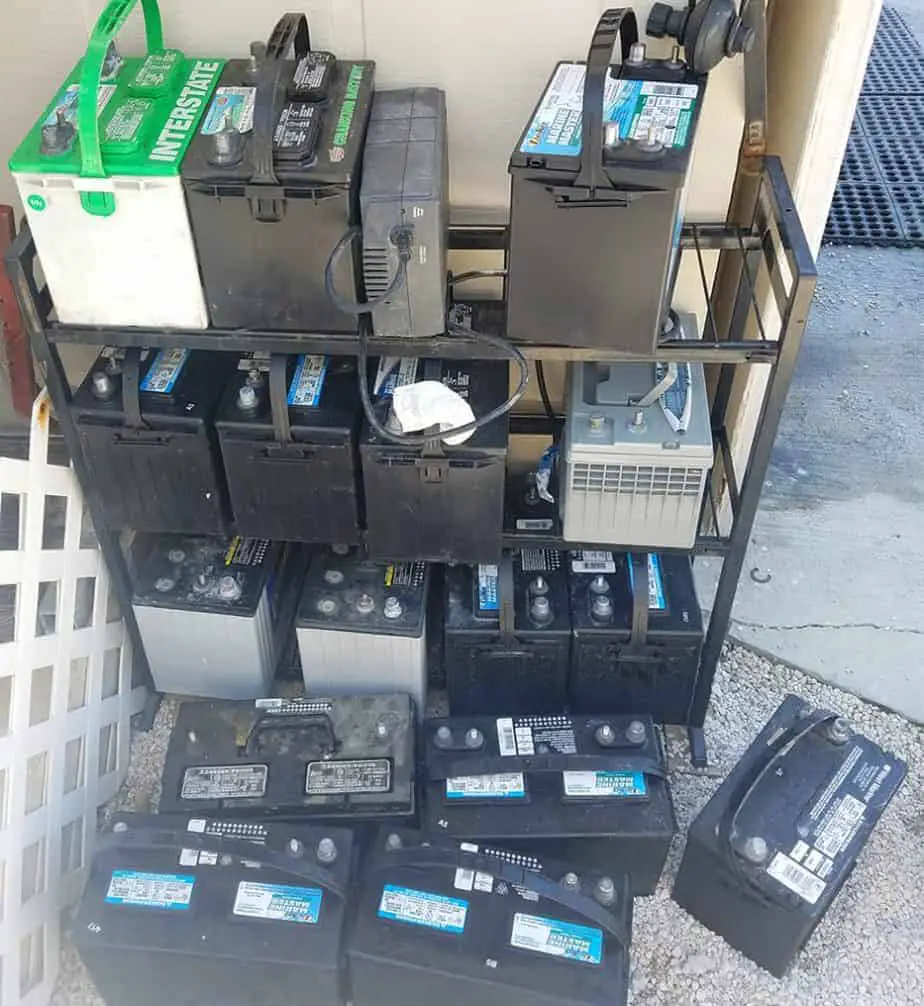For a large percentage of the boating communities around the world, there is a boating on and off season.
In the off season and beginning of the season, boats are going into or coming out of storage. This is typically the time when many people encounter boat battery trouble!
Which, makes a lot of people ask the question:
Can Boat Batteries Get Wet or Freeze? Yes, marine batteries can get wet, and they can also freeze. Both of which are not good for the overall health of the battery. Keeping batteries dry and from freezing will prolong the life of the boat battery.
This will tell you what you need to know about how to take care of your boat’s batteries during the on and off season to get the most out of them!
Different Types of Marine Batteries
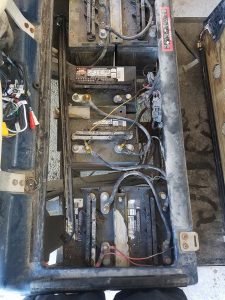 Knowing what kind of battery you have, will affect how it is you take care of them.
Knowing what kind of battery you have, will affect how it is you take care of them.
Generally, the care does not change between the different types of batteries, but there are a couple of things that need to be done on some, that doesn’t work on others.
There are three main types of marine batteries, Flooded, Gel, and Absorbed Glass Mat or AGM for short.
There are some different but particular qualities that each of these batteries has.
The Flooded Battery has a good pro to it because they are the cheapest marine battery that you can buy. However, there are a couple of problems with them.
Flooded batteries need to be periodically maintained by adding distilled water to them. It is because of this that they have access ports on the top where you can add the water.
Which means that they have to stay straight up at all times, and if they are tipped over, they can leak harmful acid all over the place!
Flooded batteries are also the weakest of the three. Meaning that they can only handle so much of the vibration and pounding of the boat before they end up failing.
Being that they are the cheapest though, they are the most common and are still a great battery for most recreational boats.
I like to run Group 27 flooded batteries in all of my boats. The 24’s are just too small, and the 31’s are just too big!
The Gel batteries are basically like the middle tier. They are more expensive than the flooded but cheaper than the AGM’s.
The “Gel” battery is a chemical mixture that creates a “Gel” inside the battery making them “maintenance free.”
So, no more adding water!
Which is excellent, especially on a boat where batteries can be in wonderful places that only smaller people can get to!
The AGM is the most expensive but the toughest Marine Battery on the market. The design of the glass mat separators that are inside the battery gives them their strength.
These batteries can withstand the most vibrations and the hardest slams and still hold up for longer periods of time.
They are also best suited for major power draws. Such as lots of lights, pumps, massive stereo systems, and tons of electronics.
Overall, AGM’s are the best Marine Battery on the market, but just like everything else, when it becomes the best, it becomes the priciest.
Do Marine Batteries Need Water?
 After talking about the different types of marine batteries, you already know the answer! There is a little more to it than just adding the water though.
After talking about the different types of marine batteries, you already know the answer! There is a little more to it than just adding the water though.
I want to take a moment to talk about the type of water. It is recommended that distilled water is used. Most of the time I put distilled water in the batteries.
There have been a couple of times though on my own personal batteries that I have used regular old hose water!
Was there a difference? In my opinion, not really.
In fact, the batteries last just as long, it seems. The main thing is to keep any dirt or contaminants out of the water when you are filling the battery.
That means cleaning the top of the battery off before filling it with water! We all know how dirty it can get in the bilge, or battery compartment of a boat.
It is also extremely important that you fill the correct amount of water to the battery as well.
When you look down into the vent, you will see the bottom of the plastic as it goes down. You want to fill to about 1/8 of an inch below that.
NEVER ADD BATTERY ACID TO A MARINE BATTERY!
I have seen this done, and it is not good. It gets messy and dangerous, as well as destroys the life of the battery.
Batteries have a specific chemical mixture of acid and water in order to last the longest amount of time.
As the battery is used, charged, discharged, and charged again, the water evaporates from inside the battery.
The only thing that needs to be added is water — not acid.
All this does is throws off the mixture of the two and changes the length of time the battery will last.
Battery manufacturers have been making and designing batteries for years and years.
Wouldn’t you think they have the mixture figured out correctly by now? So there is no need to add acid to the battery!
Can A Boat Battery Get Wet?
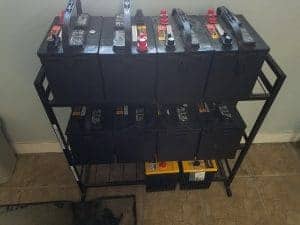 As we said at the beginning of the article, yes, the battery can get wet. That doesn’t mean that it is good for the battery though.
As we said at the beginning of the article, yes, the battery can get wet. That doesn’t mean that it is good for the battery though.
Batteries that stay dry and clean will last the longest.
Of course, this is not always the case, and especially not in a boat! More often than not, the batteries do get wet.
Being mindful of this, it is a good idea to take a rag and clean off the tops of the batteries about every six months.
Furthermore, the condensation, moisture, and dirt that accumulates on the top of the battery create a parasitic draw.
What happens is that as these components build up on top of the battery, it connects the positive and the negative posts enough to allow for the battery to discharge itself.
Even while it is just sitting there! We talk about this in detail in a section of another article that you might want to check out: Do Outboards Have Alternators & Charge Batteries?
So making sure that the batteries stay clean and are not discharging themselves will provide for a longer life of the battery.
We all know marine batteries are not cheap and most commonly, they only have a one year warranty.
You can shop around and find a couple of manufacturers that provide a little longer warranty period. But, most commonly one year is all they give you.
Probably because it isn’t uncommon for a battery to fail after only two years!
Dealing With a Submerged Boat Battery
Getting wet, as in submersion, is an entirely different ball game. This is usually, extremely bad.
Submersion is also extremely hard on the battery and most of the time destroys the battery.
Water is super conductive for electricity. So when a battery is fully submerged, it immediately starts discharging.
In this case, the battery is in a dead short, and it is trying to power everything connected to it through the water; making this dangerous and hard to deal with.
The dead short usually destroys the battery making it useless.
How it was submerged is another factor. If the battery was fully discharged when it was submerged, sometimes this can be saved.
If the battery was fully charged, it usually shorts out and cooks itself.
Also, what type of battery was it? The flooded battery will take in the water it was submerged in.
While the closed AGM will not; so long as it is not left under water for very long.
Another factor is what kind of submersion are we talking about?
Was the battery dropped in the lake off the dock, was it dropped in saltwater, freshwater, or did the boat partially sink?
All of these will have different effects and scenarios that can play out.
So depending on your situation, the battery might be salvageable, then again it might be trash.
You have a 50/50 chance here depending on your situation.
Should You Disconnect Your Boat Battery?
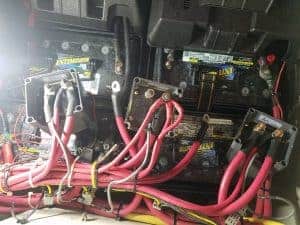 Disconnecting the boat’s battery when it is going into storage is a good thing. Though, this will depend on how your boat is wired up.
Disconnecting the boat’s battery when it is going into storage is a good thing. Though, this will depend on how your boat is wired up.
For most boats, when the battery switches are turned off, there are still things that are hooked to and drawing power from the battery.
As the days go by that the boat is sitting, the battery is being drained. Disconnecting one of the posts on the battery will eliminate this draw from the battery.
It is important to remember when disconnecting a post, you want to make sure that the float switch and bilge pump are still able to function.
Unless you have the drain plug out of the boat, you want to make sure the bilge pump can pump out any water that collects in the boat.
It doesn’t really matter which post you disconnect if you have the battery switch off and the boat wiring is correct.
There used to be a big discussion on removing one post before another, which is still an important thing to understand.
At the same time though, it is rare that a problem is created by connecting one side before the other.
As a rule of thumb I still always remove the negative cable first and then the positive side.
That is if the boat is wired correctly and the battery switch is first in line before anything else gets its power. Then it won’t matter as long as that switch is off.
When connecting the battery, I usually go in the reverse order.
I like to put the positive cable on and connect that before the ground; just in case something is not hooked up correctly or the battery switch has failed.
The real issue that you can see when disconnecting and connecting a battery is swapping the leads!
This is a big no-no and a huge problem starter if it does happen. If the key switch is on, now you will have a huge problem!
I personally worked on a boat that a client brought in after changing the battery. They left the key switch and the battery switch on! Then, accidentally hooked up the battery backward!
With the positive on the negative posts and the negative on the positive, it back fed power to the engine and smoked the motors ECU or engine control unit.
AKA a very expensive computer that controls the engine.
We also just had the same thing happen to someone else with a brand new engine. They changed the battery, hooked it up backward, then drove the boat around!
It burned up the boat harness, key switch, and the tachometer, along with some other wires in the bilge!
Therefore, although it is better to disconnect the battery when storing the boat if you are disconnecting your batteries, please make sure you connect them up correctly!
Just disconnecting one post will save you a lot of headache and embarrassment too!
Can A Boat Battery Freeze?
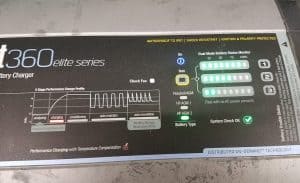 Yes! Well, partially! Boat batteries can freeze, but there are different situations depending on the type and charge of the battery!
Yes! Well, partially! Boat batteries can freeze, but there are different situations depending on the type and charge of the battery!
Remember when we talked about the three different types of batteries, the flood, gel, and AGM?
Well, the flooded battery is a lot more susceptible to damage due to freezing. However, when it is fully charged, it can withstand temperatures well below freezing.
On the other hand, if the flooded battery is fully discharged and it gets below freezing, you can kiss that battery goodbye!
The Gel batteries can withstand the freezing a lot better.
There is a point, however, when the temperature drops so low that the battery can still freeze. Keeping them fully charged and periodically checking them will help avoid this.
The AGM will take the lowest temperature to get it to freeze.
If it is not fully charged though, because of the design, when it does freeze, it isn’t like the flooded battery, where the battery is ruined.
The AGM can actually freeze, yet leave you with the ability to charge it up again! You won’t lose the battery as you do with the flooded battery.
Again though, this plays into the cost that it takes when you buy the battery, and whether or not you can justify spending the extra cash for the features!
Moral of the story when it comes to freezing is that if you keep the battery fully charged, it will take a lot more for it to freeze!
How To Store Boat Batteries Over the Winter
Knowing that a boat battery can freeze, you can now take into account how you are storing the battery over the winter months of the year.
The best way to keep from having to deal with dead or ruined batteries is to take them out of the boat.
You know the importance of properly removing and installing the batteries, so we don’t need to beat that horse.
Taking the batteries out of the boat; then storing them inside of a garage, basement, shed, or shop, will give you the ability to put them on a trickle charger.
This will allow them to be maintained through the entire cold winter season.
Meanwhile, leaving you with a fully charged and ready-to-go battery to put back in the boat when boating season comes back around next year!
We all know the line “don’t leave a battery on concrete, it is bad for them.”
Though that might have been true many years ago, batteries these days are better designed and manufactured.
You can leave them on the concrete and it will not harm the battery.
Most people still like to prop them up with a block of wood to keep them off of that freezing cold concrete. Which is essentially what the whole ordeal was about.
The concrete, basically being part of the frozen earth, is much colder for the battery to be sitting on than if it is on a shelf or a block of wood.
This will give it a temperature of quite a few degrees higher than if it was sitting directly on the concrete!
Should You Leave Your Boat Battery Charger On All the Time?
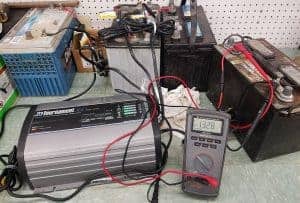 If you have been in the boating world for very long, you have come across many issues that you will encounter dealing with marine batteries.
If you have been in the boating world for very long, you have come across many issues that you will encounter dealing with marine batteries.
One of the dreaded things is overcharging a battery. Can you really overcharge a battery? Yes, you can overcharge and cook a battery.
Over-charging occurs when the charger is left on a battery, the charger fails and the sensors stop working.
Then, continues feeding the battery with juice that the fully charged battery can no longer handle.
This is where things get bad!
The fully charged battery will then become hot and the acid inside of it will start to boil.
Once the acid is boiling the battery will expand and if it expands too much, then it can crack or even explode (in extremely rare cases).
If it is a flooded battery than it can push battery acid and water out of the vents on the top of the battery, leaking harmful acid all over the battery compartment.
Which, is usually in a place that almost no one can get down to!
That is not always the case, and with the newer battery chargers that are out now, it is a lot safer to leave them on a charger at all times.
These chargers, on the other hand, are geared more to turning themselves off to save the batteries. Some chargers won’t even turn on if the battery is completely drained!
That is because the charger doesn’t see the battery and doesn’t think there is one there to charge!
This is when you have to put a jump back or something on the battery to trick the charger into seeing the battery and turning on!
Then there are trickle chargers which are another very common battery charging system that is loved by a lot of people.
The trickle charger only puts out very small amounts of amperage, so it is not harmful to the battery if it is left on.
These are great for winter storage and battery maintenance. This won’t charge the battery overnight, but it will maintain the batteries over a long period of time.
How Long Do Boat Batteries Last?
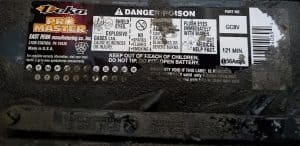 This is where you will find a lot of misinformation and opinions running through the forums and around the docks of marinas.
This is where you will find a lot of misinformation and opinions running through the forums and around the docks of marinas.
Working as a Marine Technician professionally for almost ten years now, I have had to change and diagnose my fair share of batteries.
The location where you do your boating will have an effect on the life of the battery. Batteries hold up a little better in cooler climates than they do in hot climates.
The heat is harder on the batteries. Down here in the islands, 2 years on a battery is not uncommon.
I would say that the average lifespan of the batteries that we see is around 3-4 years before they begin to fail.
Not to mislead you though, we see a lot of battery failures just after 2 years too! Then you have the rarer cases of 5-6 years.
Those are the lucky ones, the ones that don’t hammer the batteries as much as others.
Remember that the more abuse the battery is put through, than the shorter the lifespan will be.
If you are running six amplifiers powering eight subwoofers and sixteen speakers while running tons of lights, electronics, and four livewell pumps.
Then you can expect a two-year life out of those batteries.
While the two speaker stereo, single GPS, and one livewell pump battery will last five years.
It really depends on the maintenance and abuse that the battery goes through to determine what the lifespan of that battery is going to be.
Does A Boat Battery Charge While Running & How Long Does it Take?
This is a common, but fading question that you hear in the marine industry.
Nowadays, it is only on the really small horsepower engines that the engine does not charge the battery.
Though there can be problems with the electrical or the charging system on the boat, that is for an entirely different article!
If you are experiencing a charging issue, I recommend reading this article that we wrote about outboard alternators and how you can test them!
Most batteries will charge on a 12V charger at about 10 AMPS in only about 12 hours; which will get you up and going pretty quickly!
Check Us Out!
Thank you for taking the time to check out our article. We hope that it has helped you out on answering your questions that you have about Marine Batteries.
If there is something else you would like to know, just ask us in the comment section below!
Then we’d like to invite you to check out our YouTube Channel: Born Again Boating! We make all kinds of boating, How-to, DIY, and outboard service videos.
We hope you will get subscribed to the channel and then add us to your favorites so we can be your go-to resource for all of your outboard service projects!

